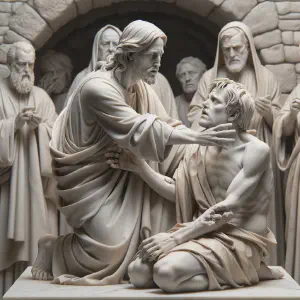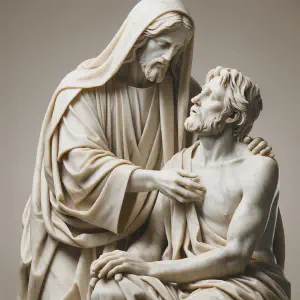The Anguish of Devotion and the Triumph of Compassion



The scene shifts to a modest dwelling in Judea, where Jesus, invited to dine with a leading Pharisee, becomes the center of silent observation. In this setting of scrutiny and expectation, a man afflicted with dropsy stands before Jesus. Seizing this moment, Jesus turns to the scholars and Pharisees with a question that challenges the very heart of the law: “Is it lawful to cure on the sabbath or not?” Met with silence, Jesus heals the man, demonstrating the power of compassion over legalism. Finally, Jesus confronts their silence with a piercing question about saving a son or an ox on the Sabbath, highlighting the hypocrisy in their strict adherence to the law. The Pharisees, rendered speechless, are left to ponder the depth of Jesus’ wisdom, which places human need and mercy above ritualistic compliance. In these narratives, from Paul’s passionate plea to the Psalmist’s exultation and Jesus’ teachings, a central theme emerges: the journey from law to grace, from ritual to relationship, and from anguish to assurance in the all-encompassing love of God.
Five Questions
What does Apostle Paul’s anguish in Romans 9:1-5 reveal about his character and faith?
Paul’s anguish reveals his profound empathy and dedication to his people, the Israelites. His willingness to be cut off from Christ for their salvation is a testament to his deep love and commitment, not only to God but also to his fellow brethren. This self-sacrificial spirit demonstrates an extraordinary depth of faith, where Paul’s devotion extends beyond personal salvation to the spiritual well-being of his entire community.
How does the Psalmist’s praise in Psalms 147:12-20 relate to the theme of divine favor and care?
The Psalmist’s praises in Psalms 147 emphasize the special relationship between God and Jerusalem, symbolizing His chosen people, Israel. By highlighting how God has strengthened, blessed, and provided for them, the Psalmist underlines the theme of divine favor and care. This particular psalm serves as a reminder of God’s continual guidance and protection, showcasing His unique covenant with Israel.
In John 10:27, Jesus speaks of his sheep hearing his voice. What does this imply about the relationship between Jesus and his followers?
This verse from John encapsulates the intimate relationship between Jesus and his followers. The metaphor of sheep recognizing the shepherd’s voice signifies trust, familiarity, and guidance. It implies that Jesus’ followers have a deep, personal connection with Him, understanding and following His teachings. This verse emphasizes the idea of spiritual discernment and the followers’ commitment to heed Jesus’ call.
What lesson does Jesus teach through His actions and words in Luke 14:1-6?
In this passage, Jesus teaches a crucial lesson about the essence of law and compassion. By healing on the Sabbath and challenging the Pharisees with a rhetorical question, He illustrates that compassion and mercy are at the heart of God’s law. This act defies rigid interpretations of religious practices and underscores the importance of prioritizing human need and kindness over legalistic adherence to religious rules.
How do these scriptures collectively enhance our understanding of the journey from law to grace in Christian faith?
These scriptures collectively illustrate a transition from a strict interpretation of the law to an understanding of grace in Christian faith. Paul’s empathy, the Psalmist’s celebration of divine favor, and Jesus’ emphasis on compassion over legalism collectively demonstrate a movement towards a more personal, merciful, and relational understanding of God’s intentions. They suggest that faith is not just about adhering to rules but about internalizing God’s grace and expressing it through love and compassion towards others.
Bible Study
Romans 9:1-5
Brothers and sisters:
I speak the truth in Christ, I do not lie;
my conscience joins with the Holy Spirit in bearing me witness
that I have great sorrow and constant anguish in my heart.
For I could wish that I myself were accursed and cut off from Christ
for the sake of my own people,
my kindred according to the flesh.
They are children of Israel;
theirs the adoption, the glory, the covenants,
the giving of the law, the worship, and the promises;
theirs the patriarchs, and from them,
according to the flesh, is the Christ,
who is over all, God blessed forever. Amen.
Apostle Paul, a central figure in the spread of Christianity and author of many New Testament letters, expresses deep sorrow for his fellow Israelites who have not recognized Jesus as the Messiah. His willingness to be separated from Christ for their sake aligns with Catholic values of sacrificial love and concern for the spiritual well-being of others, reflecting the call to love one’s neighbor as seen in the Great Commandment.
Psalms 147:12-20
Glorify the LORD, O Jerusalem;
praise your God, O Zion.
For he has strengthened the bars of your gates;
he has blessed your children within you.
He has granted peace in your borders;
with the best of wheat he fills you.
He sends forth his command to the earth;
swiftly runs his word!
He has proclaimed his word to Jacob,
his statutes and his ordinances to Israel.
He has not done thus for any other nation;
his ordinances he has not made known to them. Alleluia.
The Psalmist, traditionally King David, a central Old Testament figure known for his poetic and musical contributions to worship, praises God for His special care for Jerusalem and Israel. This passage aligns with the Catholic emphasis on gratitude and recognition of God’s blessings, reflecting the teachings of the Catechism on God’s providence and love.
John 10:27
My sheep hear my voice, says the Lord;
I know them, and they follow me.
Jesus Christ, the central figure of Christianity, speaks of a deep, personal relationship between Himself and His followers, akin to a shepherd and his sheep. This aligns with Catholic teachings on the importance of a personal relationship with Christ, as well as the Church’s understanding of pastoral care, where the clergy are often seen as shepherds guiding their flock.
Luke 14:1-6
On a sabbath Jesus went to dine
at the home of one of the leading Pharisees,
and the people there were observing him carefully.
In front of him there was a man suffering from dropsy.
Jesus spoke to the scholars of the law and Pharisees in reply, asking,
“Is it lawful to cure on the sabbath or not?”
But they kept silent; so he took the man and,
after he had healed him, dismissed him.
Then he said to them
“Who among you, if your son or ox falls into a cistern,
would not immediately pull him out on the sabbath day?”
But they were unable to answer his question.
In this passage, Jesus, the Son of God and Savior in Christian belief, challenges the Pharisees’ strict interpretation of the Sabbath law by healing a man with dropsy. This action and His subsequent questioning highlight the Christian values of mercy and compassion, aligning with the Church’s teachings on the primacy of love and grace over legalistic adherence to rules.
Lessons
In these passages, we witness the deep anguish of Apostle Paul for his people, and his willingness to sacrifice for their salvation, reflecting a profound depth of faith and devotion. The Psalmist’s praises remind us of the unique relationship between God and His chosen people, highlighting His care and guidance. Jesus’ teachings in the Gospel reinforce the importance of understanding and living the spirit of the law, not just its letter. His healing on the Sabbath and his subsequent challenge to the Pharisees illustrate the supremacy of compassion and mercy over rigid adherence to religious practices. These readings collectively teach us the transformative power of grace, the value of a personal relationship with God, and the call to practice compassionate action in our faith journey.
Meditation Prayer


